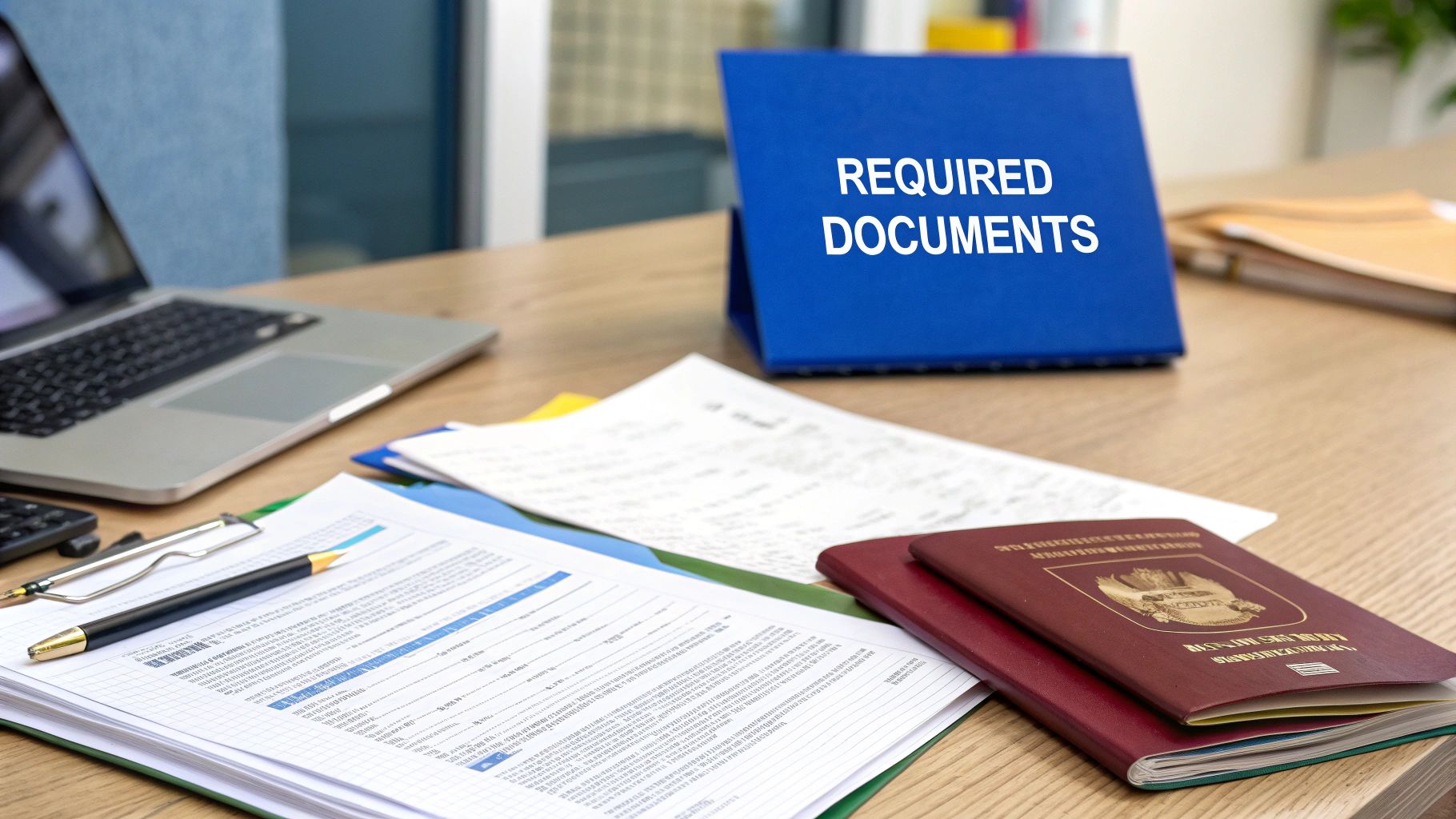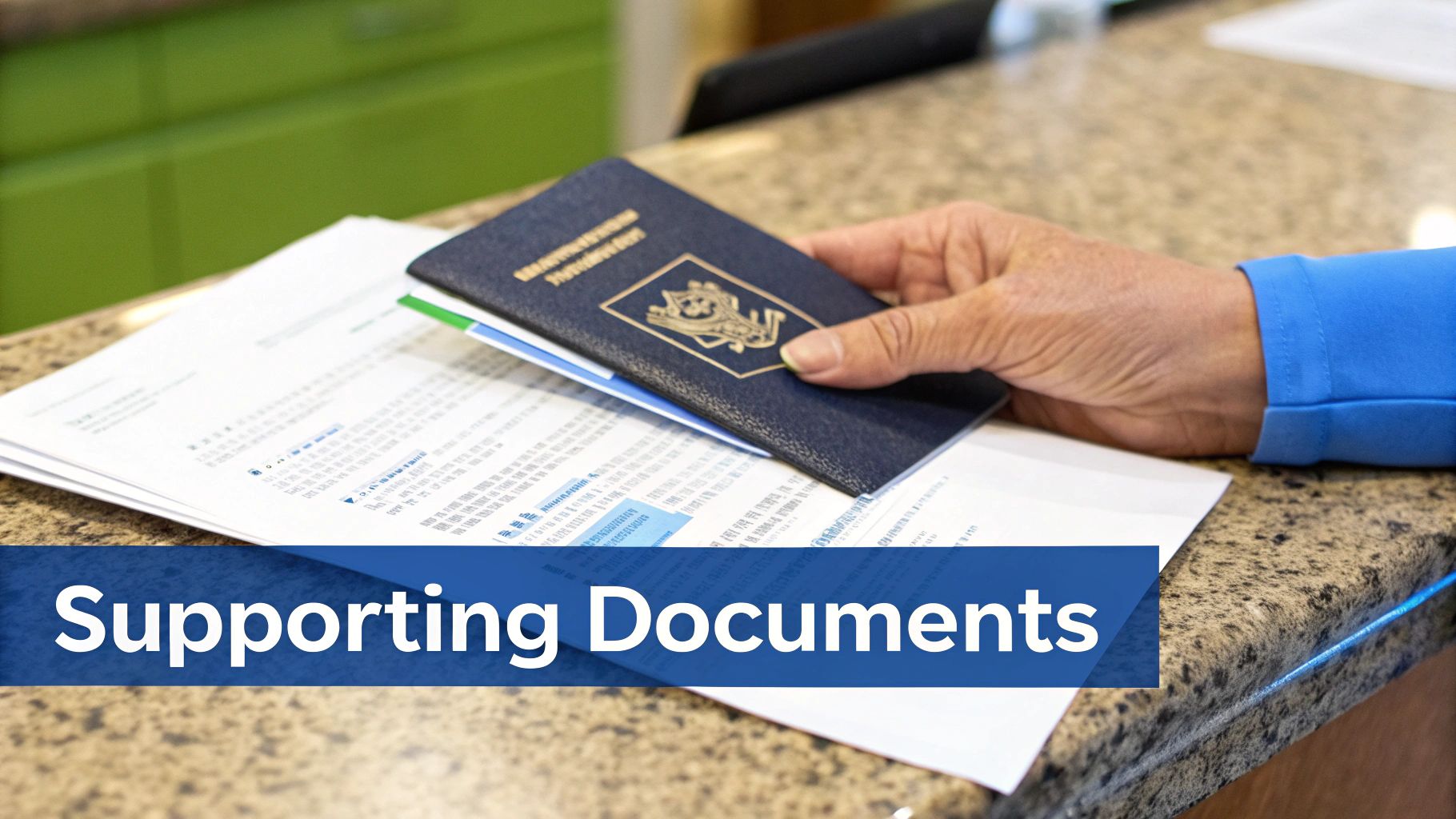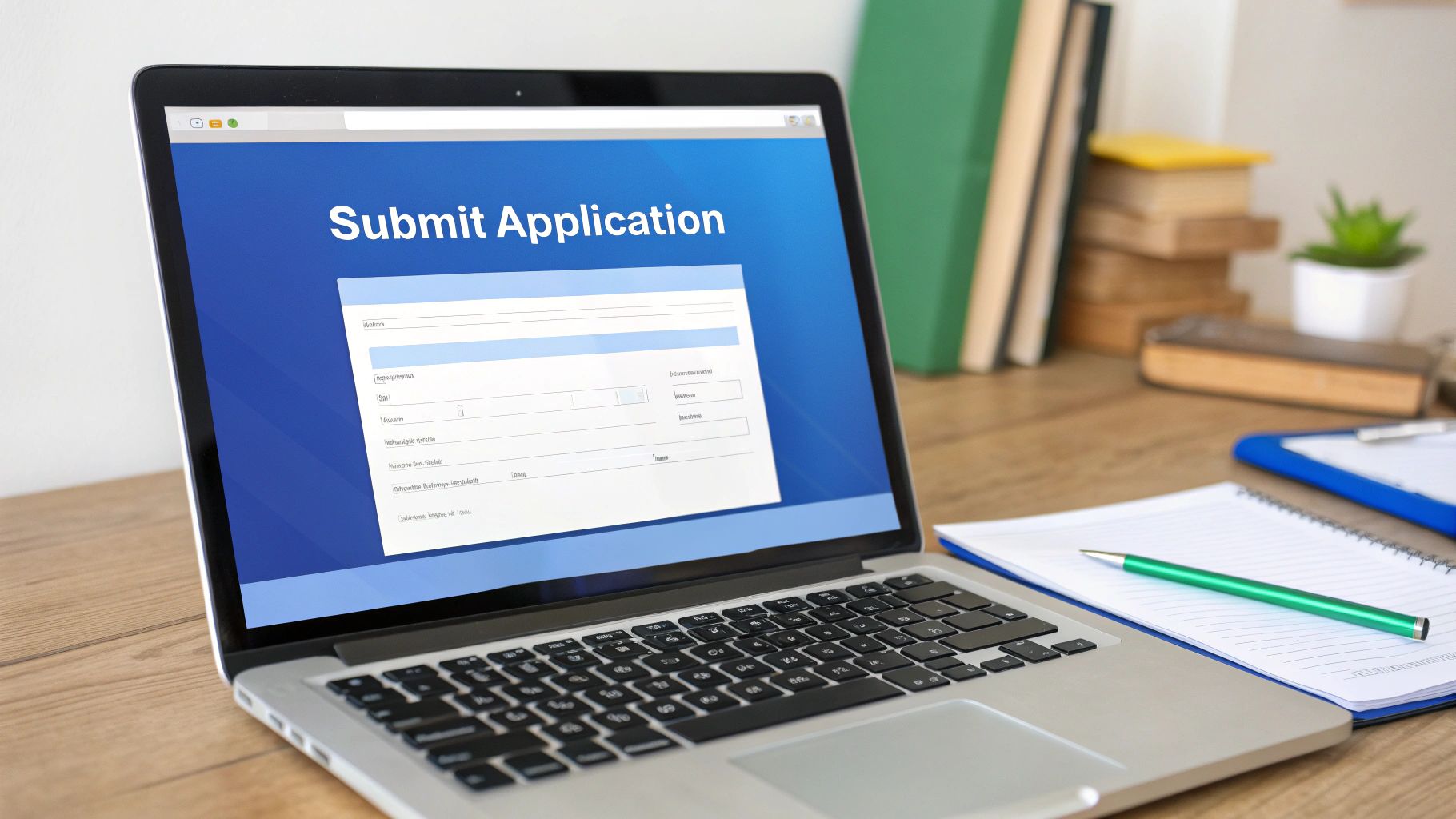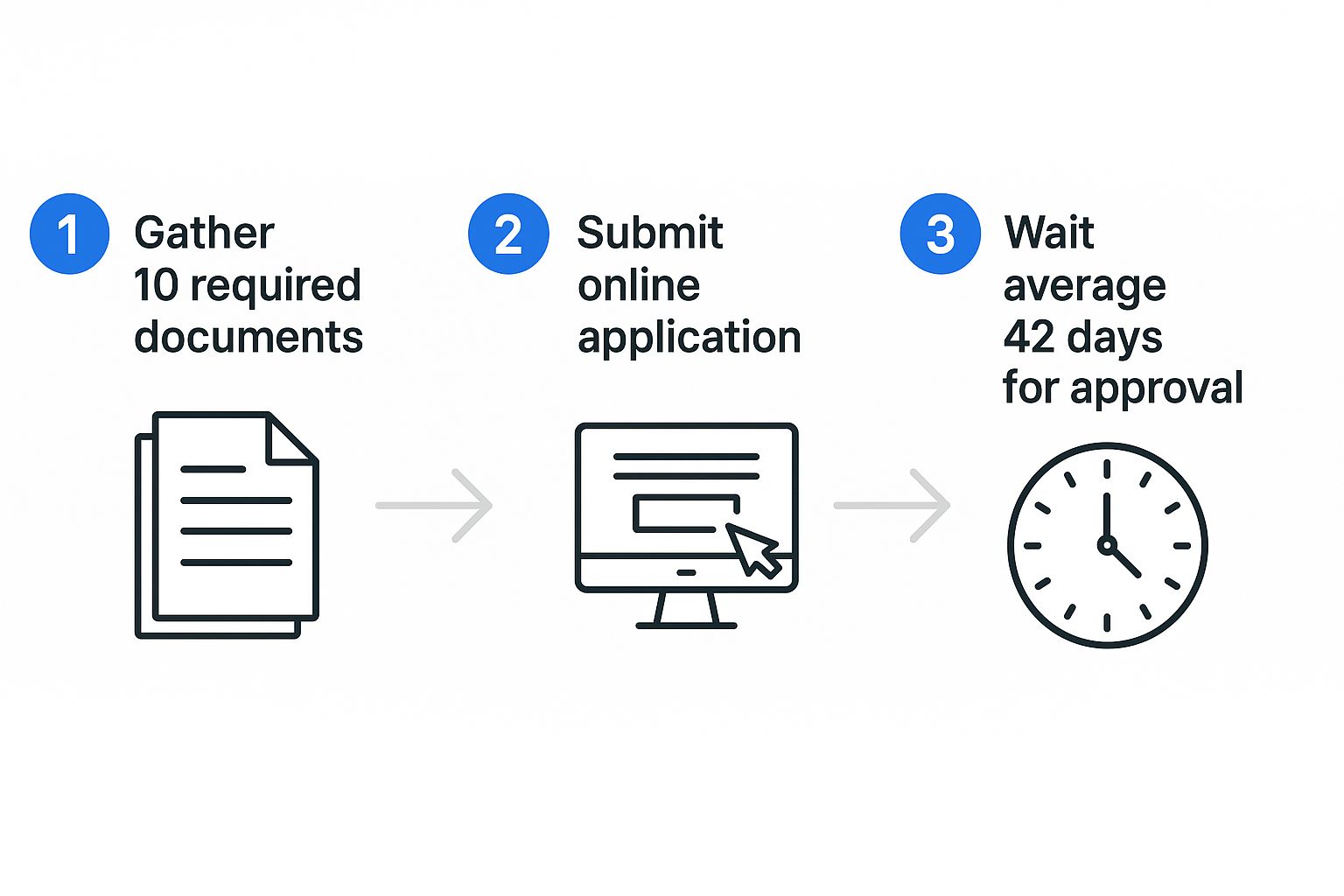Documents Needed for Work Permit in Canada: A Practical Guide for Nigerians

To get your Canadian work permit application off to a flying start, you’ll need a few non-negotiable items: a valid job offer, the completed Application for Work Permit Made Outside of Canada (IMM 1295), your Nigerian international passport, and proof of your professional qualifications. Think of these as the absolute bedrock of your application – getting them right from the get-go is critical for anyone planning to japa.
Nailing Down Your Core Application Documents
Picture your Canadian work permit application like building a house in Lekki. If the foundation is weak, the whole structure could come crashing down. For Nigerians dreaming of working in Canada, that foundation is a specific set of documents.
Getting these papers organised with precision is your first real test. A tiny mistake, like a missing number or an inconsistent date, can cause major delays or even lead to a flat-out refusal. This stage isn’t about convincing the visa officer you’re a great person; it’s about proving, with clear evidence, that you meet the basic requirements.
The All-Important Job Offer Letter
This is where it all begins. Without a legitimate job offer from a Canadian employer, your journey stops before it even starts. And this isn't just a simple letter—it has to meet strict standards laid out by Immigration, Refugees and Citizenship Canada (IRCC). It must be printed on official company letterhead and clearly outline your role, salary, and the conditions of your employment.
Crucially, for most jobs Nigerian applicants target, the offer must come with a positive Labour Market Impact Assessment (LMIA) number. An LMIA is a document issued by the Canadian government confirming that your employer couldn't find a Canadian citizen or permanent resident to do the job. It's their green light to hire you from Nigeria.
Your job offer letter is the cornerstone of your entire application. Make sure it explicitly states your salary in Canadian dollars, lists your job duties according to the National Occupational Classification (NOC), and includes the LMIA number. If that number is missing and your role isn't exempt, the application is unfortunately a non-starter.
Your Passport and Application Forms
Next up: proving you are who you say you are. You'll need your Nigerian international passport, which must have at least two blank pages. I always advise clients to ensure their passport has at least two years of validity remaining. This simple check helps you avoid headaches down the line when it's time to extend your stay.
Finally, there’s the main application form itself: IMM 1295 (Application for Work Permit Made Outside of Canada). This is a very detailed document that digs into your personal history, education, and work experience. My best advice here? Be brutally honest and consistent. Every single detail you provide will be cross-referenced with your supporting documents. It’s a bit like filling out a JAMB form—any discrepancy can lead to disqualification.
Getting these core pieces right builds a strong, confident case for the visa officer from the very beginning.
Before diving into the supporting documents, let's summarise the absolute essentials you need to have in hand.
Essential Documents for Your Canadian Work Permit
This table breaks down the core documents every Nigerian applicant must prepare for their IRCC work permit application. Think of this as your primary checklist.
| Document Type | Key Details for Nigerian Applicants | Why It's Non-Negotiable |
|---|---|---|
| Valid Job Offer | Must include an LMIA number (unless exempt), salary, and job duties matching the NOC. | This proves you have a legitimate reason to come to Canada and a specific job waiting for you. |
| Form IMM 1295 | The "Application for Work Permit Made Outside of Canada" must be filled out completely and honestly. | This is the official application form where you present your case to the Canadian government. |
| Nigerian Passport | Needs at least two blank pages and should be valid for more than two years from your application date. | This is your primary identity document; without it, you can't travel or be identified. |
| Proof of Funds | Bank statements showing you can support yourself upon arrival (typically ₦2,000,000 to ₦3,500,000). | It shows IRCC you won't become a financial burden on the state before you receive your first paycheque. |
Having these four items perfectly prepared is the first, and most important, step towards getting that approval.
Proving Your Skills and Your Promise to Return

Getting all the official forms right is just one part of the puzzle. The real challenge is telling a convincing story to the Canadian visa officer. You need to persuade them of two absolutely critical things: first, that you're the perfect person for the job, and second, that you'll head back to Nigeria once your work permit is up.
Your supporting documents are where you make this case. Think of it like this: the job offer gets your application looked at, but these documents are what will get it approved. This is your chance to really shine, showing off your professional value and the strong ties that bind you to Nigeria.
Showcasing Your Professional Experience
Let's start with your skills. Canadian visa officers need to see solid proof that you can actually do the job you’ve been offered. Vague claims won't cut it.
- Reference Letters: These need to be more than just a quick note from a former boss. For Canadian standards, a powerful reference letter is on official company letterhead and signed by a manager or HR. It must detail your job title, salary, employment dates, and—most importantly—a list of your specific duties. Instead of just "Software Developer," a good letter would say something like, "Developed and maintained front-end code using React for three major client projects."
- Educational Credential Assessment (ECA): While not always a strict requirement for a work permit, getting an ECA from an organisation like WES (World Education Services) is a smart move. It officially converts your Nigerian degree—say, a BSc from UNILAG—into its Canadian equivalent. This removes any guesswork for the visa officer and is a non-negotiable step for many permanent residency paths later on.
- Professional Certifications: Don't forget to include copies of any certifications relevant to your field. As you compile these, it's crucial to know exactly what's needed for your line of work. This resource is helpful for identifying necessary medical certifications for various job roles.
Demonstrating Unbreakable Ties to Nigeria
This is where many applications fall apart, so pay close attention. You have to prove, beyond a shadow of a doubt, that you have compelling reasons to return to Nigeria. The visa officer's primary concern is that you won't overstay your permit.
A very common reason for refusing Nigerian applicants is "insufficient ties to home country." You can't just assume they'll know you plan to return; you have to prove it with evidence. Your application must paint a picture of a life firmly rooted in Nigeria.
So, what exactly are these "home ties"? Think about what anchors you to Nigeria.
- Family Responsibilities: Are you married? Is your spouse staying in Nigeria? Include your marriage certificate. Do you have children? Provide their birth certificates. If you're the main caregiver for elderly parents, gather evidence like medical reports or affidavits to show that.
- Property and Assets: Owning property is a massive plus. If you have land in Ibeju-Lekki or a flat in Abuja, include the deeds of assignment or other ownership documents. Proof of significant investments, a running business registered with the CAC, or even car ownership documents also carries a lot of weight.
- Current Employment: A letter from your current job in Nigeria is golden. It should state that you are on an approved leave of absence and are expected back on a specific date. This shows you have a career to come back to.
Your aim is to build a clear, undeniable picture of a stable and established life in Nigeria—a life you fully intend to return to. When you combine this with a strong professional profile, your application becomes incredibly persuasive.
Targeting Canada’s High-Demand Job Sectors

Applying for a Canadian work permit isn't a simple case of ticking boxes on a generic checklist. The documents needed for a work permit in Canada can change drastically based on your line of work. This is because Canada actively seeks out specific skills to fill gaps in its labour market, and proving you have those skills is your golden ticket.
Think of it like this: your standard application documents get your foot in the door. It's the sector-specific paperwork that truly proves you belong there. For Nigerian professionals, this means carefully matching your credentials to what Canadian provinces are searching for right now.
Customising Your Application for In-Demand Fields
Your profession directly influences what extra proof you’ll need to show. A one-size-fits-all application just won’t do the job. You have to prove you’re not just a qualified professional, but the exact type of professional Canada needs.
-
Healthcare Professionals (like Nurses): If you're a registered nurse in Nigeria, your NMCN licence is a great start, but it’s not the final step. You must get your credentials verified by the nursing regulatory body in the Canadian province you intend to work in. For example, that would be the British Columbia College of Nurses and Midwives (BCCNM) for B.C. This step is absolutely mandatory.
-
Tech Workers (like Software Developers): A university degree is expected, but the tech industry is all about practical skill. A powerful portfolio that shows off your projects—complete with links to live websites or your GitHub repository—is often more persuasive than your academic transcripts alone. Don't forget to include testimonials from past clients.
-
Skilled Trades (like Truck Drivers): Your Nigerian driver's licence isn't enough to get you on the road in Canada. You'll need to provide details on your specific class of licence, a clean driving record or abstract, and sometimes even proof that you're enrolled in a Canadian truck driving certification programme.
Matching Your Skills with Provincial Needs
Canada's approach to immigration is very regional. Each province has unique streams designed to attract workers for industries they're desperate to fill.
In Atlantic Canada, for example, the required documents for a work permit are heavily influenced by these provincial priorities. For many people applying from outside Canada, only those with job offers in key sectors like trucking, tech, and resource development will even be considered. This just goes to show how vital it is to align your application with both the job market and the region's economic goals. You can see this in action by looking at Nova Scotia's immigration priorities for 2025.
The takeaway here is crucial: Do your homework. Dig into the specific requirements for your occupation and the province where your job offer is located. Providing that extra proof from the very beginning shows the visa officer that you’re a serious, well-prepared candidate who fits their exact needs.
This targeted strategy can make a huge difference in the strength of your application. It proves you're not just looking for any job, but that you’re ready to contribute to a sector where your skills are truly in demand.
For students who have already studied in Canada and are looking at their next steps, our guide on the Canada post-graduate work permit offers similar practical advice.
Clearing the Financial and Medical Hurdles

Alright, let's talk about the two parts of the application that often cause the most stress for Nigerians: proving you have enough money and passing the medical exam. These are critical steps, and getting them right shows the visa officer that you're a serious, well-prepared candidate.
The whole point is to demonstrate two things: you can support yourself when you first land in Canada, and you meet the country's health standards. Think of it less as ticking boxes and more as building a case of trust.
Proving You Have Sufficient Funds
When you apply for a work permit, IRCC needs to see that you won’t be stranded before you get your first paycheque. While there isn't a fixed "magic number" for this, a healthy and stable bank balance goes a long way in giving them confidence.
You'll need to submit official bank statements, usually covering the last four to six months. What they're really looking for is a consistent financial history. A sudden, large deposit just before you apply is a massive red flag. This practice, often called 'money dumping', makes visa officers very suspicious.
If you did receive a large sum of money as a gift, you absolutely must explain its origin with a formal gift deed or an official letter. Our complete guide on how to prepare your proof of funds for Canada digs much deeper into the specific strategies that work best for applicants from Nigeria.
Expert Tip: The credibility of your financial proof is far more important than the raw amount. A visa officer is much more convinced by a stable account with a consistent history than a large balance that just appeared out of nowhere. You need to prove the money is genuinely yours and has been for a while.
Navigating the Upfront Medical Examination
Canada has strict health standards to protect its public health system, so a medical exam is mandatory. For applicants in Nigeria, this isn't something you can do with your regular family doctor. You must book an appointment with a panel physician specifically approved by IRCC. You'll find these authorised doctors in major cities like Lagos and Abuja.
The exam itself involves a general physical check-up, some blood tests, and a chest X-ray.
Here’s a pro tip: get an upfront medical exam. This means you complete the examination before you even submit your work permit application. Doing this can seriously speed up the processing time because the panel physician sends your results directly to IRCC, making your file 'decision-ready' much faster.
With the current backlogs, IRCC is very strict about complete applications. An incomplete file, especially one missing medicals, is a common reason for long delays.
After your examination, the clinic will provide a confirmation document. Make sure you upload this document with the rest of your application package. It’s a simple step, but one that can save you months of waiting.
Submitting a Flawless Application
You've done the heavy lifting and gathered every last document, from your offer letter to your proof of funds. Now for the final hurdle: pulling it all together and hitting 'submit'. This is where the smallest mistakes can lead to the biggest headaches, causing long delays or even an outright refusal. Your goal here is a perfectly polished application.
This stage demands your full attention. The visa officer scrutinising your file is trained to spot inconsistencies. If the dates on your IMM 1295 form don't line up perfectly with your reference letters, that's an instant red flag. It’s like a puzzle—every single piece has to fit just right.
Mastering the Application Forms
The main form you'll be wrestling with is the IMM 1295 (Application for Work Permit Made Outside of Canada). Think of this as your official story. It covers everything from your personal details to your travel and work history.
A common pitfall for Nigerian applicants is the work history section. Precision is everything. Don't just put "Manager at GTBank." Instead, detail your exact role, the specific branch, and the precise start and end dates. Then, make sure this information is identical across your CV and reference letters.
The same goes for your travel history. You need to list every single trip you've taken outside of Nigeria in the last decade. Forgetting that quick trip to Ghana or a holiday in Dubai might seem trivial, but to an officer, it could be interpreted as an attempt to hide something. Be transparent.
Key Takeaway: Check everything twice, then check it a third time. The details on your forms must be a perfect mirror of what’s in your passport, job offer, and CV. Consistency is what builds trust and gives the visa officer the confidence to approve your application.
This image gives you a bird's-eye view of these final stages, from document assembly all the way to getting that final decision.

As you can see, once your application is in, the waiting game begins, which can be a significant part of the journey.
The Final Steps on Nigerian Soil
After you submit your application through the IRCC portal, you're almost there, but not quite. You'll soon receive a Biometric Instruction Letter (BIL) in your account. This is a crucial document.
With your BIL in hand, your last major task is to book and attend a biometrics appointment at a Visa Application Centre (VAC). In Nigeria, you have two options: Lagos or Abuja. Don't delay—book this appointment as soon as you get the letter.
When you go for your appointment, you’ll need to have three things with you:
- Your Nigerian international passport.
- The Biometric Instruction Letter (BIL) you received.
- Your appointment confirmation letter.
The process itself is quick and simple. They'll take your fingerprints and a photo to verify your identity. It's a small step, but a non-negotiable one.
To give you an idea of the numbers, Canada issued approximately 105,195 work permits through the Temporary Foreign Worker Program in the first half of 2025 alone. This program is essential for filling roles in sectors like construction and caregiving, which are popular fields for many Nigerian professionals. Your application is one of thousands, which is why making it flawless is your best strategy to stand out. You can learn more about the trends in Canadian work permit processing.
Once your biometrics are captured, your work is done. All that’s left is to wait for the decision. By being meticulous with your submission, you’ve put your best foot forward and given yourself the strongest possible chance of success.
Your Top Work Permit Questions Answered
Even with a perfect checklist, you're bound to have questions as you go through the application process. It’s completely normal. This last section is all about tackling those common, pressing queries that Nigerian applicants often have about the documents needed for a work permit in Canada. Let’s get you some straight answers and clear up any confusion.
How Much Money Is Enough for Proof of Funds?
This is the big one, isn't it? While Immigration, Refugees and Citizenship Canada (IRCC) doesn't set an official "magic number" for work permits, you absolutely have to prove you can support yourself before that first paycheque lands.
Picture yourself arriving in a city like Toronto or Calgary. You'll need cash for your first month's rent and security deposit, a transport pass, and to stock your fridge. A good, safe range to aim for is somewhere between CAD $3,000 and $5,000 if you're coming alone.
This isn't just about having the money; it's about proving it's yours. The funds should be in your personal bank account, and the statement should show a clean history for at least the last four months. A large, last-minute deposit from a friend or family member just before you apply is a massive red flag for visa officers. It looks suspicious, so avoid it at all costs.
Do I Really Need a Nigerian Police Certificate?
Yes, absolutely—if IRCC asks for it. When requested, you’ll need to get a Police Character Certificate directly from the Nigeria Police Force Criminal Investigation Department (CID). It's crucial that this certificate is recent, usually issued within the last six months.
Remember, you'll need a certificate from Nigeria and from any other country where you’ve lived for six months or more since you turned 18. This process can be notoriously slow back home, so it's wise to start this application the moment you decide to gather your other documents. Don't wait to be asked.
Think of the police certificate request as a non-negotiable requirement, not a suggestion. Delaying this is one of the top reasons applications get stalled. Get a head start on it to save yourself a world of stress and long waits.
What if My Canadian Employer Has Never Heard of an LMIA?
Okay, stop everything. This is a major red flag that you need to handle carefully but immediately. The simple truth is that most Canadian employers need to secure a positive Labour Market Impact Assessment (LMIA) before they can legally hire someone from outside of Canada.
If your potential boss seems clueless about this, it’s on you to inform them. You can gently and professionally guide them to the official Employment and Social Development Canada (ESDC) website for all the details. An application that needs an LMIA but doesn't have one is an automatic refusal. No exceptions. Never just assume your job is exempt; always get confirmation.
Can I Bring My Family With Me on a Work Permit?
Yes, you often can! But be prepared for a bigger application with more paperwork and a higher financial bar to clear. Your spouse or common-law partner could be eligible for an open work permit, which is fantastic, and your dependent children might be able to get study permits to attend school.
To make this happen, you'll need to add proof of your relationships—like your marriage certificate and birth certificates for the kids—to your application. Most importantly, your proof of funds will need to be significantly higher to convince the visa officer that you can comfortably support everyone when you first land in Canada.
Planning a move to Canada has a lot of moving parts, and getting reliable information is everything. That's where JapaChat comes in. As Nigeria’s first AI immigration expert, we give you instant, accurate answers to all your questions, from visa documents to what to do when you arrive. Start planning your journey with confidence today at JapaChat.

Leave a Reply